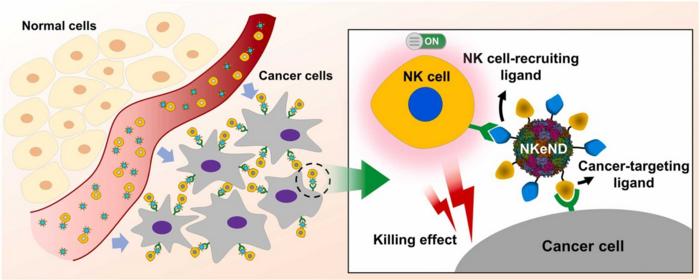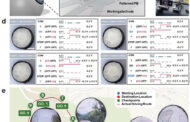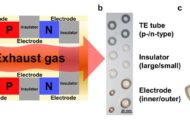
Schematic image of NK cell-engaging nanodrones (NKeNDs).
CREDIT: UNIST
A groundbreaking study led by Professor Sebyung Kang and Professor Sung Ho Park in the Department of Biological Sciences at UNIST has unveiled a remarkable breakthrough in cancer treatment.
The research team has successfully developed unprecedented “NK cell-engaging nanodrones” capable of selectively targeting and eliminating cancer cells, offering a potential solution for intractable types of cancers.
The innate lymphoid cells known as natural killer (NK) cells play a vital role in the body’s immune response against cancer. Numerous efforts have been made to harness the power of NK cells to develop effective cancer therapies. Now, the research team has designed and fabricated exceptional NK cell-engaging nanodrones, referred to as NKeNDs, using AaLS protein cage nanoparticles.
These groundbreaking NKeNDs simultaneously display cancer-targeting ligands, such as HER2Afb or EGFRAfb, and NK cell-recruiting ligands, aCD16Nb, on the surface of the AaLS through the SpyCatcher/SpyTag protein ligation system. The dual ligand-displaying NKeNDs, named HER2 @NKeND and EGFR@NKeND, have demonstrated the ability to selectively bind to HER2-overexpressing SK-OV-3 cells and EGFR-overexpressing MDA-MB-468 cells, respectively, as well as human NK cells.
The physical engagement of human NK cells with the target cancer cells mediated by the NKeNDs activates the NK cells, enabling them to effectively eliminate the target cancer cells in vitro. Remarkably, in SK-OV-3 tumor-bearing mice, the administration of HER2 @NKeNDs along with human PBMCs facilitates the infiltration of activated human NK cells into the tumor sites. As a result, tumor growth is significantly suppressed without causing noticeable side effects.
This groundbreaking study showcases a novel approach to developing cancer-specific NK cell engagers by utilizing protein cage nanoparticles and recombinant cancer cell binders. It offers tremendous potential for the selective treatment of previously intractable types of cancers.
Professor Kang Se-byung expressed his excitement about the study, stating, “This research presents new possibilities for immune treatment through NK cell delivery nanodrones, overcoming challenges such as the movement and survival of NK cells. We aim to provide new opportunities for customized treatments that selectively address various types of cancer through further research, including cancer-specific immune cell induction.”
Original Article: Revolutionary nanodrones enable targeted cancer treatment
More from: Ulsan National Institute of Science and Technology
The Latest Updates from Bing News
Go deeper with Bing News on:
NK cell-engaging nanodrones
- Feed has no items.
Go deeper with Bing News on:
Targeted cancer treatment
- Hoag Family Cancer Institute Welcomes Oncology Power Couple as New Program Directors
Hoag has announced that oncology “power couple” Monica Mita, M.D.,M.Sc., Mh.D.S., and Alain Mita, M.D., M.Sc., have been recruited as the new program directors for the Hoag Family Cancer Institute. Dr ...
- How mRNA Is Rewriting the Rules of Cancer Treatment
MIT spinout Strand Therapeutics has developed a new class of mRNA molecules that can sense where they are in the body, for more targeted and powerful treatments. What if training your immune system to ...
- Targeted use of enfortumab vedotin for the treatment of advanced urothelial carcinoma
An interdisciplinary research team has published new findings that indicate which patients with advanced urothelial carcinoma could benefit in particular from the new targeted therapy with the ...
- New 'targeted' cancer treatment 'represents real progress'
The new drug therapy has been approved by the National Institute for Health and Care Excellence (Nice) after studies showed it lessened chemotherapy side-effects ...
- Targeted Therapy, Treatment Disparity Featured at Cancer Meeting
Leading cancer researchers from UC San Francisco presented talks about advances in targeted therapy, cancer genomics, eliminating treatment disparities and other cancer research topics at this year’s ...







